In a grim yet transformative public health initiative, Haiti is leveraging tragic deaths caused by rabies-infected dogs to galvanize action against the deadly disease. Supported by the Pan American Health Organization (PAHO) and the World Health Organization (WHO), Haitian health authorities are addressing a crisis that has claimed multiple lives this year, including that of a nine-year-old boy in the remote village of Butête. The boy, bitten by a stray dog, succumbed to rabies after exhibiting severe symptoms such as muscle spasms and hydrophobia. His death underscores the urgent need for improved healthcare access and preventive measures in a country grappling with political instability, economic hardship, and widespread poverty. Between 2022 and 2024, Haiti investigated over 8,000 suspected rabies cases in dogs, with 46 confirmed cases and eight human deaths. In response, PAHO and WHO have mobilized a nationwide network of health workers, including epidemiology assistants and mobile lab technicians, to combat the disease. A canine vaccination campaign launched in August aims to immunize 140,000 dogs, supported by innovative tools like a mobile app for real-time data collection. The initiative also focuses on public education and improving access to post-exposure rabies vaccines. Despite Haiti’s ongoing challenges, the campaign has been hailed as a significant success, with an estimated 80% vaccination coverage expected to curb the virus’s spread. Rabies remains a global threat, causing 59,000 deaths annually, 40% of which are children. However, the Americas have achieved a 98% reduction in human rabies cases since 1983, demonstrating the effectiveness of coordinated public health efforts.
